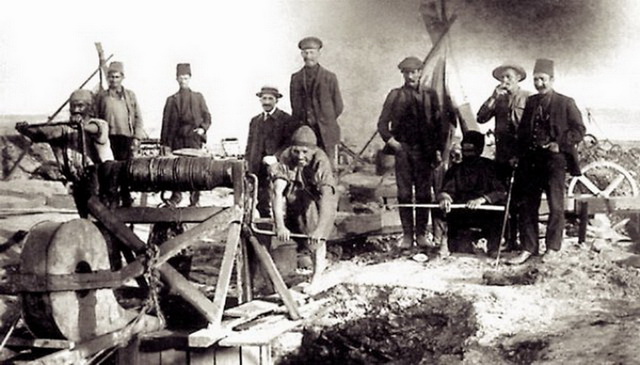Nobels' contribution to first oil boom in spotlight at Baku event

By Nigar Orujova
Azerbaijan's capital Baku has hosted a two-day conference on Nobel Brothers Petroleum Company's contribution to the first oil boom that occurred in the city in the late 19th and early 20th centuries.
Baku Nobel Heritage Fund and State Oil Company of the Azerbaijan Republic (SOCAR) hosted the Nobel Brothers' First International Research-Innovative Conference, which was organized by Azerbaijan-Scandinavian Cooperation at the premises of legendary Villa Petrolea on October 22-23.
The conference featured discussions on the Nobel Brothers Petroleum Company's role in developing Azerbaijan's oil industry.
The planning and implementation of the conference was supported by international organizations, including the Nobel Family Society, Centre for Business History in Stockholm, Nobel International Fraternity, National Historical Archive of Azerbaijan, National Archives of Georgia, and Nobel Brothers Batumi Technological Museum.
The overall purpose of the conference was to increase the understanding of successful technical, social and socio-economic innovations.
The event brought together about 50 foreign participants including members of the Nobel Family Society, director of the Nobel Museum, ambassadors of foreign countries to Azerbaijan and representatives of international companies.
The Nobels family's business in Azerbaijan
The famous Swedish Nobels family name is synonymous with oil, the once and future lifeblood of Azerbaijan's economy. The Nobel family led the charge to develop Azerbaijan's oil resources at the end of the 19th century.
They introduced innovations like oil pipelines and steam-powered tankers to the oil industry, transforming Baku into one of the world's leading oil sources for a glorious and brief period.
Robert Nobel was the first of the Nobels to understand the future and success of the oil industry in Baku. He convinced his brother Ludwig to invest in oil extraction.
Thus, they established the Nobel Brothers Oil Extracting Partnership, which became the most authoritative oil concern in Russia and worldwide in 1879. The Fire Temple outside Baku called Atashgah became a symbol of the company.
The company became known as Branobel, an abbreviated version of the Russian name, Bratyev Nobel, meaning Nobel Brothers.
The Nobel Brothers Company bought the first tanker in the Caspian Sea in order to reduce transportation expenses. The ship, which they called Zoroaster, was built according to drafts made by Ludwig Nobel in Sweden at the Motall Shipbuilding Factory in 1877.
After the success of that first tanker, the Nobel Brothers built
an entire fleet of tankers, giving names to the ships such as
Moses, Spinoza, and Darwin. The tankers increased the turnover of
goods to such an extent that by 1890, Baku had become the busiest
port in the world.
The next technique they used to modernize their production of oil
was introduction of black oil for heating the ships' engines.
The Nobel Brothers also were first to introduce railway tanks for oil transportation. They built a pipeline which reduced the expenses of transportation five-fold and paid for itself within a single year.
Great changes were made in the area of oil storage. Taking into
account the chaotic oil storage of the ground pits, vessels and
lakes where great quantities of oil evaporated or simply penetrated
back into the ground, the Nobel Brothers started to use iron
reservoirs and soon huge tank parks were used not only in Baku, but
in other cities as well.
All this modernization allowed the Nobel Brothers to take the lead
in the oil business by 1900 and to gain tremendous profit during
the 47 years of their Azerbaijani partnership.
The Rothschild Company and Shell led by Samuel Markus were also
involved in oil production in Baku. These three foreign companies
held more than half of the oil extraction and 75% of the oil
production commerce.
By the early 20th century, the Nobel Brothers company had become the dominant company in Azerbaijan. In 1917 the company consisted of more than 20 subsidiary firms with a total capital investment of more than 130 million rubles.
Oil turned Baku into a center of world oil commerce and enabled it to exert an incredible influence on the entire Caucasus economic development.
Baku oil millionaires built a lot of historical constructions, and Nobels were not an exception. They built houses, schools, hospitals for ordinary workers.
But one of their first buildings in Baku was Villa Petrolea, home to the Nobel family, which is now one of Baku's newest museums.
Villa Petrolea and park were created in two years. In 1882 almost six months were spent on the architectural plans; Swedish, Italian and French architects were involved.
Soil was brought from Lankaran, southern Azerbaijan; fresh water was brought from Astrakhan; trees and shrubs came from Italy and France. A corner of paradise emerged here, an oasis with 10 buildings. The house was the central building. This is where they lived and received guests.
When the Bolsheviks came to power, the Nobels' industrial empire was destroyed and all the oil fields were expropriated.
Emanuel Nobel was the last of the Nobels who left Baku in 1919. He and the oil company's chief manager were saved from the Red Army soldiers by their workers.
Villa Petrolea stopped being a family home after the 1917 communist revolution. The villa was variously an army barracks, a children's home, offices finally became unused.
This was the case until the Baku Nobel Heritage Fund, set up in 2004 to restore the Nobel heritage in Azerbaijan, came along, which led to the restoration of Villa Petrolea in April 2008.
Baku's Villa Petrolea is the first Nobel family museum in the world, as this museum is dedicated to all the Nobels' family members.
Here we are to serve you with news right now. It does not cost much, but worth your attention.
Choose to support open, independent, quality journalism and subscribe on a monthly basis.
By subscribing to our online newspaper, you can have full digital access to all news, analysis, and much more.
You can also follow AzerNEWS on Twitter @AzerNewsAz or Facebook @AzerNewsNewspaper
Thank you!
